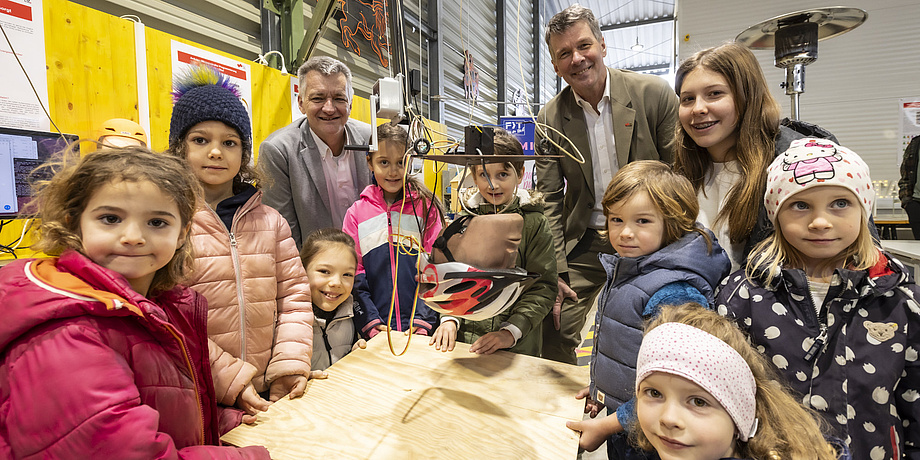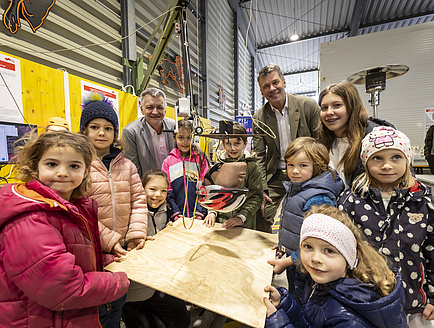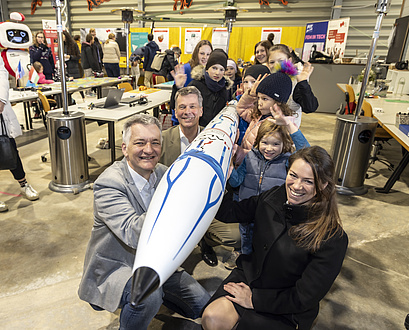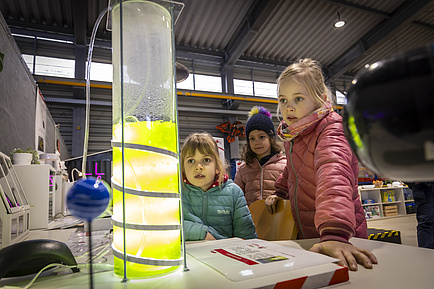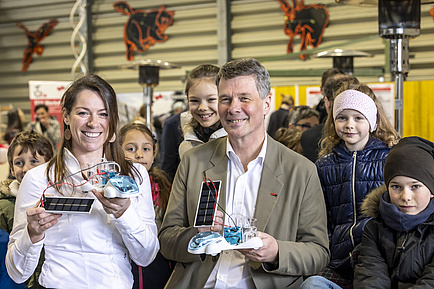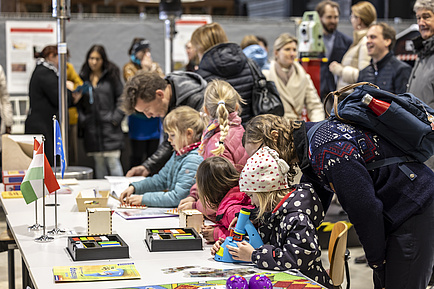One year after its opening, around 6,000 children and young people have already visited the TU Graz Super Science Space science MINKT laboratory (MINKT subjects correspond roughly to STE(A)M subjects in the English-speaking area) to immerse themselves in the world of technology and science. Supported by the City of Graz and the Styrian Department of Education, Graz University of Technology (TU Graz) is now expanding its programme for the younger generation at Campus Inffeldgasse with an open-air laboratory. The 20 new experimental and hands-on stations are open from March to October and are dedicated to topics such as climate protection and sustainable energy technologies under the motto Power Plant Earth. At the opening on 19 March, TU Graz Rector Horst Bischof and Graz City Councillor for Finance Manfred Eber took the opportunity to try out some of the stations themselves.
Up to 300 children and young people per week can now become young researchers in the new 260 square metre laboratory space, free of charge thanks to financial support from the City of Graz. At the stations designed by various TU Graz institutes, the budding talent acquire knowledge about renewable energies, hydropower, energy efficiency, climate protection and sustainable urban development. They carry out experiments on the various set-ups and test assemblies and thus develop individual skills, understand scientific and technical contexts and discover their own interests.
Shaping the future together
“Researching, discovering and creating is in the genes of children and young people. TU Graz promotes this with a diverse programme for the younger generation, which we are expanding with an exciting new component in the form of the new open-air laboratory,” said TU Graz Rector Horst Bischof on the occasion of the opening. “In our MINKT lab, future generations deal with important topics and questions about their own future in a playful way and learn how to help shape it. This awakens their enthusiasm and hopefully makes them want to undergo training or study engineering or sciences at our university. I would like to thank everyone involved at TU Graz and the City of Graz for making this unique MINKT experience possible.”
City Councillor for Finance Manfred Eber explained: “TU Graz, with around 14,000 students, is an important part of our city and is highly regarded internationally. It is important to us to make this knowledge accessible to our young city dwellers in an age-appropriate and exciting way, and especially to raise girls’ interest in the technical field. The fact that around 6,000 children visited the MINKT lab in its first year speaks for itself, which is why we are very happy to support the addition of an outdoor lab.”
The 20 new stations of the MINKT open-air laboratory at a glance
- At the biochemistry station, visitors explore how algae transport oxygen into our oceans.
- The Lego city demonstrates modern urban energy management and shows the path from power generation and transport to the final utilisation of electrical energy.
- As a filter system in the oceans, mussels absorb nutrients such as phosphorus and nitrogen. Simple experiments explain how they keep the water clean.
- A transparent heat pump provides an insight into how it works.
- The large water trough with test turbine offers a glimpse into the generation of electricity from hydropower.
- Using a fuel cell and a hydrogen car, visitors learn about electrolysis and the use of hydrogen as an energy source.
- The PV system explains the technology used to turn solar energy into green electricity and illuminates the Lego city.
- At the surveying station, experiments are carried out on the tectonic shift of the Earth’s plates.
- In the crash test experiment, a pendulum measures the forces acting on the head in a bicycle accident.
- The effects of various loads on a model bridge can be explored in the bridge oscillation test.
- The Aerospace Team Graz and the High Performance Sailing TU Graz student team show how to build a rocket and control a sailing drone.
- Carrying out research on optics using UV light is possible in the physics light laboratory. By constructing geometric figures from glow sticks, visitors can recognise how the eye reacts optically to light sources and light propagation.
- The sensor systems station shows how sensors record our environment and what control options this opens up.
- A magnetic field sensor can be used to investigate the strength and changes in a magnetic field in more detail.
- With the rucksack problem, the aim is to pack various objects in the best possible way and thus stow as much luggage as possible in as little space as possible.
- How do trains always stay exactly centred between the rails? The young researchers can find out by testing the so-called sine wave themselves.
- The jumping station visualises the seismographic effects of a jump on the environment.
- The gravitational funnel shows how the gravitational force affects objects.
Wide range of offers for schools and all interested parties
The new open-air laboratory at Inffeldgasse 26 offers its own workshops for kindergartens and schools outside the school summer holidays from March to October. These can be booked as part of regular lessons or afternoon supervision. The workshops include all the stations, have a duration of two to three school hours and are free of charge thanks to the support of the City of Graz.
During the school year, the laboratory is open to visitors every Wednesday afternoon as a “talent garden” free of charge, but by prior appointment. During the summer holidays, the open-air laboratory will be included in the Summer course programme of the TU Graz Super Science Team.
The existing MINKT laboratory at Inffeldgasse 25a with 16 stations on topics from all the faculties of TU Graz is open all year round for school workshops and on Thursday afternoons as an open lab for all visitors, apart from the school summer holidays. During the summer holidays it has its own course programme.
Would you like to receive the latest stories, news, research stories, interviews or blog posts from TU Graz directly on your smartphone or in your email inbox? Subscribe to the TU Graz Telegram newsletter for free.
